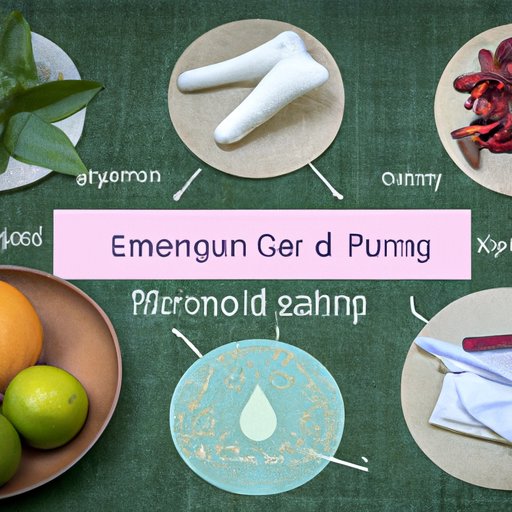
Introduction
Menstrual cramps are a common occurrence for women, with over 80% experiencing them at some point in their life. While some may experience minor discomfort, others may have severe pain that can interfere with their daily activities. In this article, we will explore natural remedies, meditation, exercise, stress management, and diet that can help alleviate menstrual cramps.
Natural Remedies for Menstrual Cramps
Menstrual cramps, also known as dysmenorrhea, are caused by the contractions of the uterus. These contractions are caused by the release of natural chemicals called prostaglandins which prompt the uterus to expel its lining. Menstrual pain can range from mild to severe and can be accompanied by other symptoms such as bloating, back pain, and mood swings.
While over-the-counter painkillers such as ibuprofen can alleviate the pain, some natural remedies can provide relief without side effects.
Heat Therapy
Heat is a great natural remedy for menstrual cramps. Applying heat to the lower abdomen, lower back, or thighs can help relax the muscles and reduce pain. You can use a heating pad, hot water bottle, or a warm towel to apply heat. Make sure it’s not too hot to avoid burns, and don’t apply for more than 20 minutes at a time.
Herbal Teas
Herbal teas are another great way to relieve menstrual cramps. Chamomile, ginger, and cinnamon teas have anti-inflammatory properties and can help reduce pain and cramps. You can enjoy them hot or cold, but make sure to avoid caffeine and alcohol, which can dehydrate you and worsen your symptoms.
Essential Oils
Essential oils like lavender and clary sage can also help alleviate menstrual pain. You can add them to your bathwater, use them in diffusers or topically on your skin. Make sure to use high-quality and pure oils and dilute them in a carrier oil like coconut oil before applying them to your skin.
Mind Over Matter: How Meditation Can Help Ease Your Cramps
Meditation is a great way to calm your mind and reduce stress, which can help alleviate menstrual pain. Meditation also helps bring awareness to your body and teaches you to manage your pain with mindfulness.
Benefits of Meditation to Alleviate Menstrual Cramps
Meditation can help reduce stress and anxiety, lower blood pressure, and improve your overall well-being. When it comes to menstrual cramps, meditation can help reduce the perception of pain and improve your moods.
Basic Instructions on How to Start With Meditation
To start with meditation, find a quiet and comfortable place, free from distractions. Sit down cross-legged with your back straight and your eyes closed, and focus on your breath. Breathe in and out slowly and try to clear your mind. You can also try guided meditation or take classes to get started.
Movement and Exercise: Why Staying Active Can Help Alleviate Your Cramps
While you may not feel like exercising during your menstrual cycle, physical activities can help reduce menstrual pain and cramps.
Explanation of How Exercise Helps Alleviate Menstrual Cramps
Exercise can help release endorphins, which are natural pain killers in the body. Exercise also helps improve blood flow and reduce inflammation, both of which can help alleviate menstrual cramps.
Different Types of Physical Activities That Are Effective
There are many different forms of exercises that can help alleviate menstrual pain. Yoga, Pilates, swimming, and walking are all great options. Gentle stretches can also help relax your muscles and ease cramps.
Precautions to Take During Menstrual Cycle
If you’re experiencing severe pain, it’s best to avoid high-intensity exercises like running or weightlifting. You should also listen to your body and take breaks when needed. Wearing comfortable and supportive clothing and using menstrual products like tampons or menstrual cups can help you stay active during your period.
De-stress and Relax: How to Manage Stress and Anxiety During Your Period
Stress and anxiety can exacerbate menstrual pain and cramps. Managing stress and anxiety during your period is crucial for alleviating pain.
Explanation of How Stress and Anxiety are Related to Menstrual Cramps
Studies have shown that when you’re stressed, your body produces more cortisol, which can increase your perception of pain. Stress and anxiety can also cause muscle tension and inflammation, both of which can worsen menstrual cramps.
Techniques to Manage Stress
Deep breathing exercises, progressive muscle relaxation, and meditation are all great techniques to manage stress. You can also try to avoid triggers that cause stress and anxiety, like caffeine, alcohol, and processed foods.
Diet and Nutrition: How Food Can Help Reduce Menstrual Cramps
Diet and nutrition play an essential role in menstrual health. Some foods can worsen menstrual symptoms, while others can help relieve pain and cramps.
Explanation of How Diet and Nutrition Affect Menstrual Cycles
Dietary factors like blood sugar levels, inflammation, and hormonal imbalances can affect menstrual cycles. Hormonal imbalances can lead to the overproduction of prostaglandins which cause menstrual pain and cramps.
Foods to Eat During Menstrual Cycle
Some foods can help reduce inflammation and menstrual cramps. These include foods rich in omega-3 fatty acids, like salmon and flax seeds, and anti-inflammatory foods like ginger, turmeric, and leafy greens.
Foods to Avoid During Menstrual Cycle
Processed foods, caffeine, and alcohol can worsen menstrual symptoms, so it’s best to avoid them during your period. Salty foods can also cause bloating and water retention, making menstrual pain worse.
Conclusion
Menstrual cramps can be debilitating, but they don’t have to be. This article explored natural remedies like heat therapy and herbal teas, meditation and mindfulness, exercise, stress management techniques and diet and nutrition for alleviating menstrual pain. Remember to listen to your body and take breaks when necessary, and experiment with different remedies to find what works best for you.
By using a combination of the remedies discussed, you can help soothe your menstrual cramps and improve your overall menstrual health.




